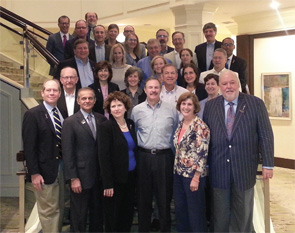The Annual Meeting
For many people, the Annual Meeting and the ACR are the same thing. “Are you going to ACR this year?” is the way we inquire about whether you will join us in Boston. The meeting is a complex undertaking to create, requiring the work of countless volunteers, ACR staff and temporary staff. In January, I attended the first two days of the Annual Meeting Planning Committee’s work. I was overwhelmed by the wealth of science we present in a compressed amount of time. I was bewildered by how this large group of people emerged from the meeting with the complicated schedule of sessions we all love. How we can meet the expectations of a wide variety of scientists and practitioners from around the globe and prevent important content from overlapping with other important content for each of these groups seems like magic to me.

Attacks Thwarted
During this year, the ACR tackled multiple attacks on the ability of rheumatologists and rheumatology health professionals to operate effective and profitable enterprises. Whether it is the daily care of patients or work in the laboratory, our ability to do what we love and what patients need is being pummeled. We have seen a federal government that seems uninterested in supporting the medical scientific community.
The funding by the federal government of rheumatology research is dwindling, and this compromises the careers of promising scientists. The portion of NIH grants awarded to rheumatology is unacceptable. The Committee on Research has vigorously requested more information on the grants-making process to better understand how these grants are distributed and to ensure rheumatology is fairly treated. Our advocates constantly press the need for more support for research.
CMS and other insurers are threatening our ability to give quality care to our patients. Some Medicare contractors have threatened to deny the professional administration of certain medications that can be self-administered by able patients. CMS will not understand that some patients simply cannot afford the cost of biologics covered under Part D and must use Part B to access effective treatment. Some Medicare contractors want to deny the costs associated with the infusion of the complex medications we use so effectively and safely to improve people’s lives.
We have even seen one insurer try to ration biologic care based on the deals they can achieve with manufacturers, not on the basis of what is right for the patient. A scheme was proposed to change stable patients to a different biologic medication based solely on the cost to the insurer. The ACR adamantly and successfully opposed this irrational threat to our patients.
